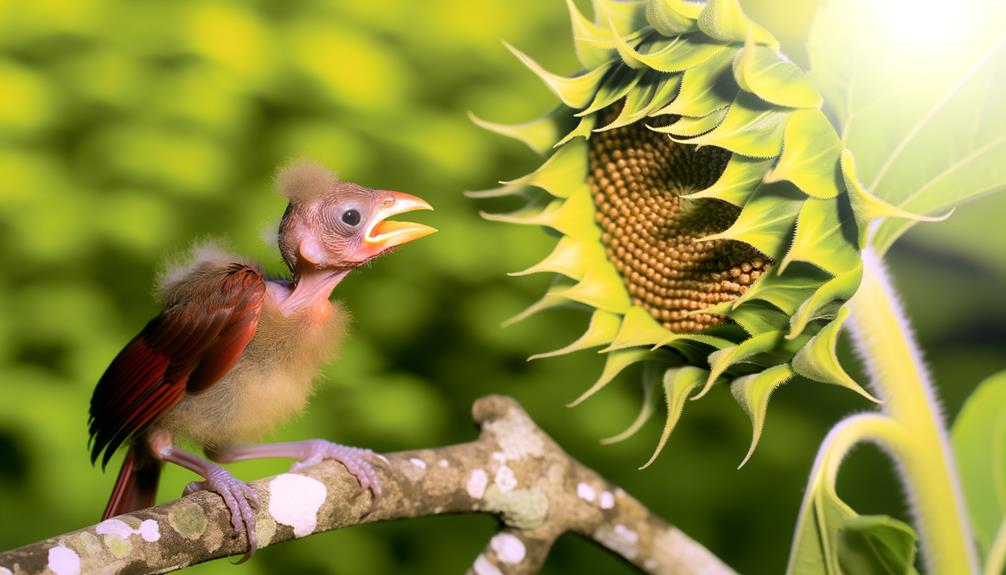Baby Brown Cardinals: 7 Facts About Eating Sunflower Seeds
Baby brown cardinals can consume sunflower seeds, but these must be finely ground to prevent choking and digestive issues. Sunflower seeds are rich in healthy fats, protein, and essential vitamins, important for their growth.
However, a balanced diet that includes protein from insects is essential for best development. The seeds should also be moistened to make them easier to digest.
Care must be taken to avoid potential pesticide residues. Understanding the specific dietary needs and feeding habits can greatly impact the well-being of baby cardinals.
For detailed guidelines on ensuring your cardinals thrive, further insights are necessary.

Key Takeaways
- Baby cardinals can eat sunflower seeds if they are finely ground to avoid choking hazards.
- Sunflower seeds should be moistened to create a manageable consistency for baby cardinals.
- Introduce sunflower seeds gradually and ensure a balanced diet with proteins like insects.
- Monitor for potential digestive issues or nutritional imbalance when feeding sunflower seeds.
- Ensure sunflower seeds are free from pesticide residue to safeguard the health of baby cardinals.
Cardinal Dietary Needs
Cardinal dietary needs encompass a diverse range of food sources, including seeds, fruits, and insects, which provide essential nutrients for their growth, energy, and overall health. These avian species benefit from a varied diet that guarantees an adequate intake of proteins, carbohydrates, fats, vitamins, and minerals.
Insects, such as beetles and caterpillars, are particularly crucial during the breeding season, supplying vital proteins and fats for developing chicks. Fruits offer essential vitamins and antioxidants, aiding in immune function and overall well-being.
A selection of seeds, like millet and safflower, contribute necessary carbohydrates and fats, supporting their energetic requirements. Understanding the detailed nutritional composition of these foods is essential for those aiming to maintain the health and freedom of cardinals in their natural habitat.
Nutritional Value of Sunflower Seeds
Sunflower seeds offer a strong nutritional profile, featuring a high concentration of healthy fats, particularly monounsaturated and polyunsaturated fatty acids. They are also a rich source of protein, providing necessary amino acids essential for growth and development.
Additionally, sunflower seeds contain essential vitamins and minerals, such as vitamin E, magnesium, and selenium, which contribute to overall health and metabolic efficiency.
Rich in Healthy Fats
Boasting a high content of monounsaturated and polyunsaturated fats, sunflower seeds provide a substantial source of healthy lipids essential for cardiovascular health and overall metabolic function. These fats play a critical role in reducing LDL cholesterol levels and promoting HDL cholesterol, thereby supporting heart health. Additionally, the omega-3 and omega-6 fatty acids found in sunflower seeds are crucial for brain function and anti-inflammatory processes.
| Benefit | Description | Emotional Impact |
|---|---|---|
| Heart Health | Reduces bad cholesterol, boosts good cholesterol | Peace of Mind |
| Brain Function | Supports cognitive processes | Mental Clarity |
| Anti-inflammatory | Reduces inflammation in the body | Physical Comfort |
Such nutritional benefits underscore the importance of incorporating sunflower seeds into diets.
High Protein Content
Containing approximately 20 grams of protein per 100 grams, sunflower seeds are a strong source of plant-based protein, essential for muscle repair, enzyme function, and overall cellular health. This high protein content is vital for the growth and development of baby brown cardinals, providing the necessary amino acids that their bodies cannot produce.
Proteins serve as the foundation for tissues, promoting growth and supporting metabolic processes. Additionally, the digestibility of sunflower seed protein promotes effective nutrient absorption, which is crucial during the early stages of avian development.
While the protein content is advantageous, it is important to evaluate the overall diet composition for a balanced intake of nutrients for optimal growth and health.
Essential Vitamins and Minerals
Rich in necessary vitamins and minerals, sunflower seeds provide a detailed array of micronutrients important for the physiological development and overall health of baby brown cardinals. These seeds are an excellent source of vitamin E, a potent antioxidant that protects cell membranes from oxidative damage.
Additionally, they offer substantial amounts of B-complex vitamins, including folate and niacin, which are essential for metabolic processes and energy production. Sunflower seeds are also rich in essential minerals like magnesium, which supports neuromuscular function, and selenium, crucial for immune system efficacy.
The presence of trace elements such as zinc and iron further enhances their nutritional profile, promoting proper growth and development in young birds, making sunflower seeds a valuable component in their diet.
Digestive System of Baby Cardinals
The digestive system of baby cardinals is specially adapted to process a diet primarily consisting of soft, easily digestible food provided by their parents. This adaptation is essential during the early stages of development when their digestive organs are not fully matured. The crop, a storage pouch in the esophagus, softens food before it reaches the stomach. The proventriculus, or glandular stomach, secretes digestive enzymes to break down food. Finally, the gizzard, although less developed in nestlings, aids in grinding food.
| Digestive Component | Function | Development Stage |
|---|---|---|
| Crop | Softens food | Early |
| Proventriculus | Secretes digestive enzymes | Mid |
| Gizzard | Grinds food | Later |
| Intestine | Absorbs nutrients | Continuous |
These specialized features enable efficient nutrient absorption and support rapid growth.
Feeding Habits of Baby Cardinals
Feeding habits of baby cardinals primarily involve a diet of soft insects and regurgitated sustenance provided by their parents, guaranteeing ideal nutrient intake during their early developmental stages.
In their first weeks, nestlings rely heavily on protein-rich insects such as caterpillars, beetles, and spiders, which are skillfully foraged by adult cardinals. This high-protein diet is essential for their rapid growth and feather development.
As the chicks mature, parents gradually introduce partially digested seeds into their diet, facilitating a smooth shift to adult feeding patterns. This method ensures that young cardinals receive balanced nutrition, leveraging both animal and plant sources for peak health.
The careful attention in feeding underscores the significance of dietary precision in early avian development.
Potential Risks of Sunflower Seeds
As baby cardinals begin to encounter a broader range of foods, it is imperative to evaluate the potential risks associated with feeding them sunflower seeds.
These risks can be categorized into four primary concerns:
- Choking Hazard: The size and shape of sunflower seeds can pose a choking risk, especially for young, inexperienced birds.
- Digestive Issues: The hard outer shell of sunflower seeds can be difficult for baby cardinals to digest, potentially leading to gastrointestinal distress.
- Nutritional Imbalance: Sunflower seeds are high in fat and may not provide a balanced diet necessary for proper growth and development.
- Pesticide Residue: Non-organic sunflower seeds may contain harmful pesticides that can adversely affect the health of baby cardinals.
Careful consideration of these factors is essential for their well-being.
Safe Food Alternatives
Considering the potential risks associated with sunflower seeds, it is crucial to identify safe food alternatives that meet the nutritional needs of baby cardinals while minimizing health hazards. Essential nutrients such as protein, calcium, and vitamins are vital for their growth and development. Soft insects, such as mealworms and caterpillars, provide a high-protein diet. Additionally, small, easily digestible fruits like blueberries and raspberries offer essential vitamins and antioxidants. Another suitable alternative is soaked dog kibble, which can supply comprehensive nutrition.
| Food Type | Nutritional Benefit | Example Foods |
|---|---|---|
| High-Protein | Supports muscle growth | Mealworms, Caterpillars |
| Vitamin-Rich | Enhances immunity | Blueberries, Raspberries |
| Balanced Diet | Comprehensive nutrition | Soaked dog kibble |
| Calcium-Rich | Strengthens bones | Crushed eggshells |
| Hydration | Maintains fluid balance | Fresh water |
These alternatives ensure baby cardinals receive a balanced and safe diet.
Preparing Food for Baby Cardinals
Preparing food for baby cardinals requires meticulous attention to the texture, size, and nutritional content of each ingredient to guarantee they can consume and digest it effectively. Achieving this involves multiple steps:
- Grinding Seeds: Sunflower seeds must be finely ground to avoid choking hazards and assure easier digestion.
- Moisture Content: Moisten the ground seeds with water or a bird-safe formula to create a manageable consistency.
- Nutritional Balance: Incorporate proteins, such as finely chopped insects or mealworms, to meet their dietary requirements.
- Feeding Schedule: Maintain a consistent feeding schedule, typically every 30 minutes to an hour during daylight, to support their rapid growth.
These practices secure baby cardinals receive the essential nutrients without compromising their safety.
Observing Cardinal Behavior
Understanding the intricacies of cardinal behavior requires keen observation of their feeding patterns, social interactions, and vocalizations to draw accurate conclusions about their habits and needs. Cardinals exhibit distinct feeding behaviors, often preferring elevated feeders and displaying a strong affinity for sunflower seeds.
Juvenile cardinals, distinguishable by their brown plumage, rely heavily on their parents for food until they can independently forage. Socially, cardinals are known for their territorial nature, especially during breeding seasons. Vocalizations play an essential role in their communication, with specific calls signaling distress, mating readiness, or territorial claims.
Signs of Malnutrition
Identifying signs of malnutrition in juvenile cardinals involves closely examining their physical appearance, behavior, and growth patterns for any abnormalities indicative of nutritional deficiencies. Symptoms of malnutrition can be subtle yet crucial to recognize. Key indicators include:
- Poor Feather Quality: Feathers may appear dull, brittle, or exhibit abnormal molting patterns.
- Stunted Growth: Juveniles may not reach expected size or weight milestones.
- Lethargy: Reduced activity levels, reluctance to fly, or prolonged periods of inactivity.
- Weakness or Tremors: Visible signs of muscle weakness, unsteady perching, or tremors.
Accurate identification demands a systematic approach, encompassing both direct observation and comparative analysis against healthy counterparts. Early detection and intervention are essential for the well-being and survival of these birds.
Tips for Birdwatchers
Effective birdwatching necessitates a comprehensive grasp of avian behavior, habitat preferences, and appropriate observation techniques to guarantee precise and pleasurable experiences. Acquiring high-quality binoculars with suitable magnification and a field guide specific to your region enhances identification accuracy.
Position yourself in a concealed location to avoid disturbing the birds, and use a notebook or digital device to document sightings meticulously. Familiarize yourself with bird calls and songs to aid in locating and identifying species, especially those that are elusive.
Additionally, understanding seasonal migration patterns and local ecosystems guarantees productive birdwatching sessions. Employing patience and maintaining a respectful distance will not only yield better observations but also contribute to the preservation of natural avian habitats.
Encouraging Healthy Growth
When observing the development of young birds, it is important to take into account their nutritional needs to ensure they grow into healthy adults. For baby brown cardinals, adequate nutrition involves more than just basic sustenance; it requires a balanced intake of proteins, fats, and essential vitamins.
To encourage healthy growth:
- Provide a protein-rich diet: Mealworms and insects are excellent sources.
- Incorporate healthy fats: Small amounts of sunflower seeds can be beneficial.
- Ensure vitamin intake: Offer fruits like berries, which are rich in vitamins.
- Maintain hydration: Fresh water is essential for proper metabolic functions.
Conclusion
In the intricate tapestry of avian nutrition, baby brown cardinals, akin to fledgling sailors steering through treacherous seas, require a delicate balance of sustenance for best growth.
Sunflower seeds, while rich in essential nutrients, pose potential digestive challenges for their immature systems. Observations reveal that diverse and appropriately sized food sources better support their development.
Therefore, ensuring a varied diet acts as the compass guiding these young voyagers toward robust health and successful maturation.






